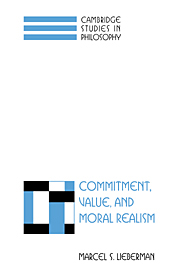2 - The challengers: Allan Gibbard and Richard Rorty
Published online by Cambridge University Press: 02 December 2009
Summary
INTRODUCTION
The position I want to defend is (a) cognitivist since it takes moral beliefs to be part of our commitments and so views them as being more than mere expressions of sentiments or feelings, and (b) (moderately) realist since these beliefs purport to represent facts of the matter, and are viewed by the agent as doing so. Clearly, my position could be challenged in two ways: either by denying that commitments incorporate beliefs, and so by implication that moral judgments involve beliefs (since such commitments, I say, include judgments regarding what is right, valuable, or good) – the noncognitivist challenge; or by denying that commitments involve these kinds of beliefs since there are no moral facts for them to represent, i.e., not only are such beliefs unnecessary for commitment, but they lack any content – the challenge from antirealism. Allan Gibbard poses the first challenge with his noncognitivist theory of rationality and normative judgments, while Richard Rorty poses the second in his notion of “irony” which forms part of his more general neopragmatist (and what he calls “antirepresentationalist”) position.
Although Gibbard and Rorty approach the question of moral realism from two radically different orientations – the former stays and operates within the standard philosophical categories and methods, while the latter seeks to overcome these – they share an assumption common to all noncognitivists and irrealists in ethics, namely, the separability of theory from practice.
- Type
- Chapter
- Information
- Commitment, Value, and Moral Realism , pp. 6 - 56Publisher: Cambridge University PressPrint publication year: 1998



